📞+86 153 7530 2641 📧 hongjing.Wang@feichuncables.com

(N)GFLGOEU-J Flat Rubber Crane Cable for Festoon Systems – Oil-Resistant, UV-Protected Solution for Moving Equipment
Discover the high-performance (N)GFLGOEU-J flat rubber crane cable, designed for festoon systems in moving machine parts, conveyors, and large industrial equipment. Engineered for flexibility, oil resistance, UV protection, and compliance with VDE standards.
hongjing.Wang@Feichun
8/4/20259 min read
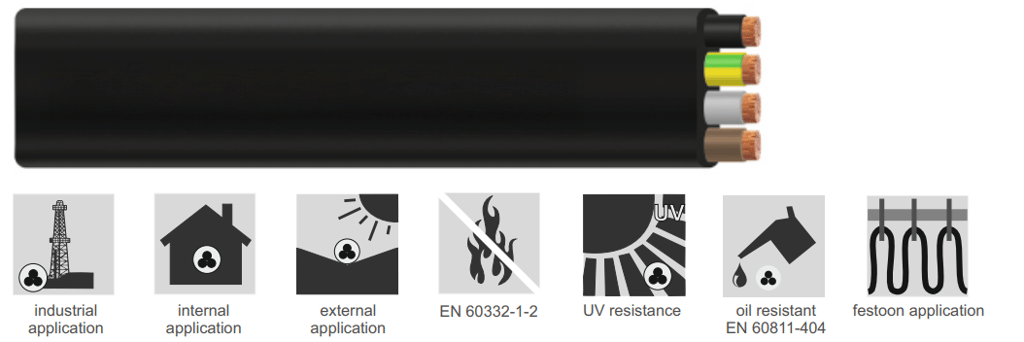

Introduction: Why Cable Selection Matters for Moving Equipment
In the demanding world of industrial automation and material handling, the reliability of power and control cables can make the difference between seamless operations and costly downtime. Cranes, conveyors, and machine tools with moving components require specialised cabling solutions that can withstand constant motion, environmental challenges, and mechanical stress whilst maintaining electrical integrity.
Festoon systems represent a critical infrastructure component in many industrial applications, providing power and control signals to moving equipment through suspended cable arrangements. These systems subject cables to unique stresses, including one-plane bending, dynamic loading, and exposure to harsh environmental conditions. The selection of appropriate cabling for such applications demands careful consideration of mechanical properties, environmental resistance, and electrical performance characteristics.
The consequences of cable failure in moving equipment applications extend far beyond simple replacement costs. Production interruptions, safety hazards, and potential damage to expensive machinery underscore the importance of choosing cables specifically engineered for dynamic applications. This reality has driven the development of specialised solutions like the (N)GFLGOEU-J flat rubber crane cable, designed to meet the exacting requirements of modern industrial mobility systems.
Overview of (N)GFLGOEU-J Cable
The Feichun® (N)GFLGOEU-J represents a sophisticated engineering solution for flexible, low-voltage power transmission in dynamic industrial environments. This flat rubber cable, manufactured in accordance with DIN VDE 0250-809 standards, combines advanced materials science with proven design principles to deliver exceptional performance in challenging applications.
Engineered as a flexible low-voltage flat rubber cable, the (N)GFLGOEU-J is specifically designed for applications requiring consistent power delivery to moving equipment. The cable's flat profile minimises space requirements whilst maximising flexibility, making it particularly well-suited for festoon systems where vertical space may be limited and bending stress concentration must be minimised.
The cable's versatility extends across diverse environmental conditions, providing reliable operation in dry, damp, and wet environments, as well as outdoor installations. With a voltage rating of 1000V, the (N)GFLGOEU-J meets the power requirements of most industrial applications whilst incorporating comprehensive protection against oil contamination, UV degradation, and ozone exposure.
This combination of mechanical resilience and environmental protection makes the (N)GFLGOEU-J an ideal choice for applications where traditional round cables may prove inadequate. The flat configuration distributes mechanical stress more evenly during bending operations, reducing fatigue and extending operational life in dynamic applications.
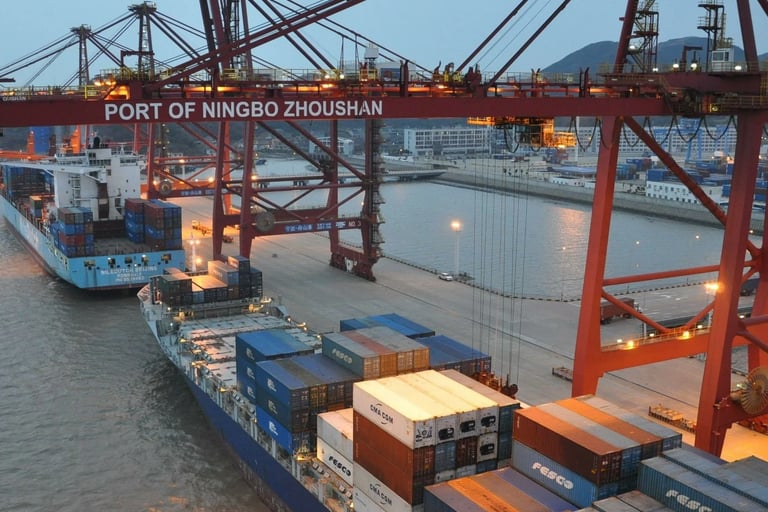

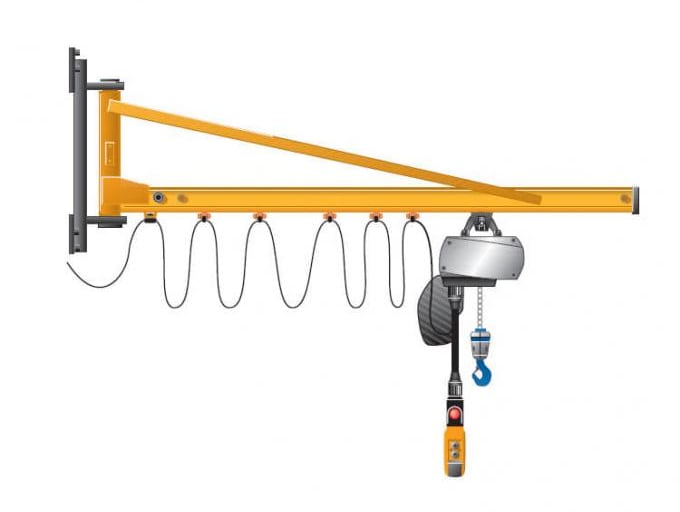

Key Features & Benefits
The (N)GFLGOEU-J cable incorporates numerous design features that collectively deliver superior performance in demanding applications. Understanding these characteristics is essential for engineers and maintenance professionals evaluating cabling solutions for moving equipment.
Mechanical Durability and Dynamic Performance
The cable's mechanical specifications reflect its engineered capability to handle high dynamic tensile forces encountered in festoon applications. With a maximum tensile load rating of 15 N/mm² on conductors, the (N)GFLGOEU-J can withstand the mechanical stresses associated with equipment acceleration, deceleration, and continuous motion. This mechanical resilience is particularly crucial in applications where cables experience regular tension variations due to equipment movement patterns.
The cable demonstrates exceptional speed tolerance, remaining operationally stable at trolley speeds up to 180 metres per minute. This capability ensures reliable power transmission even in high-speed material handling systems, where cable flexing frequency can be substantial. The flat profile contributes to this performance by providing more consistent stress distribution during rapid flexing cycles.
Thermal Performance Characteristics
Thermal management represents a critical consideration in cable selection for moving equipment, where ambient conditions and electrical loading can vary significantly. The (N)GFLGOEU-J operates reliably across an impressive temperature range, handling ambient conditions from -30°C to +80°C in festoon operations and -40°C to +80°C in fixed installations.
The cable's maximum permissible conductor temperature of 90°C provides substantial thermal headroom for electrical loading whilst maintaining insulation integrity. This thermal capability is complemented by a short-circuit temperature rating of 250°C at the conductor, ensuring safety margins during fault conditions.
Conductor Design and Electrical Performance
The (N)GFLGOEU-J employs carefully selected conductor configurations optimised for flexibility and electrical performance. Conductors up to 25mm² utilise Class 6 finest stranded construction, providing maximum flexibility for dynamic applications. Larger conductors (35mm² and above) employ Class 5 fine stranded construction, balancing flexibility requirements with current-carrying capacity.
This differentiated approach to conductor stranding ensures optimal performance across the complete size range whilst maintaining the flexibility essential for festoon applications. The plain copper construction, manufactured to DIN EN/IEC 60228 standards, guarantees consistent electrical properties and long-term reliability.
Fire Safety and Environmental Resistance
Safety considerations extend beyond mechanical and electrical performance to encompass fire behaviour and environmental resistance. The (N)GFLGOEU-J meets DIN EN/IEC 60332-1-2 standards for behaviour in fire conditions, providing essential safety margins in industrial environments where fire risks may be present.
Weather resistance characteristics enable unrestricted outdoor use, with specific resistance to ozone, UV radiation, and moisture. This environmental resilience eliminates the need for additional protective measures in many outdoor installations, simplifying system design and reducing installation costs.
Technical Specifications
The (N)GFLGOEU-J cable's technical specifications reflect comprehensive engineering optimisation for festoon applications. Understanding these parameters is essential for proper application selection and system design.
Electrical Characteristics
The cable operates at a rated voltage of U0/U 0.6/1 kV, with maximum permissible operating voltages of 0.7/1.2 kV in AC systems and 0.9/1.8 kV in DC applications. This voltage capability covers the vast majority of industrial control and power applications whilst providing adequate safety margins.
AC test voltage performance of 3.5 kV for 5 minutes demonstrates the cable's dielectric integrity and safety margins. These electrical specifications ensure reliable operation even in demanding electrical environments where voltage transients or harmonics may be present.
Construction Details
The cable construction incorporates EPR (Ethylene Propylene Rubber) compound type 3GI3 insulation, manufactured according to DIN VDE 0207-20 standards. This insulation system provides excellent electrical properties whilst maintaining flexibility throughout the cable's operational temperature range.
Core identification follows DIN VDE 0293-308 standards, ensuring consistent identification across installations and simplifying maintenance procedures. The heavy-duty rubber compound type 5GM3 outer sheath, manufactured to DIN VDE 0207-21 specifications, provides mechanical protection and environmental resistance.
Physical Dimensions and Configuration
Available configurations include multiple core counts and cross-sectional areas, with standard offerings including 12x2.5mm² configurations. The flat profile dimensions incorporate thickness tolerances of ±1.5mm and width tolerances of ±2.5mm, ensuring consistent performance whilst accommodating manufacturing variations.
Cable weight specifications, such as approximately 834 kg/km for 12x2.5mm² configurations, assist in mechanical loading calculations for festoon systems and support structures. These specifications enable accurate system design and ensure adequate support provisions.
Bending Radius Requirements
Proper bending radius management is crucial for cable longevity in dynamic applications. The (N)GFLGOEU-J specifies different minimum bending radii for fixed installation versus flexible applications, recognising the different stress patterns encountered in each application type.
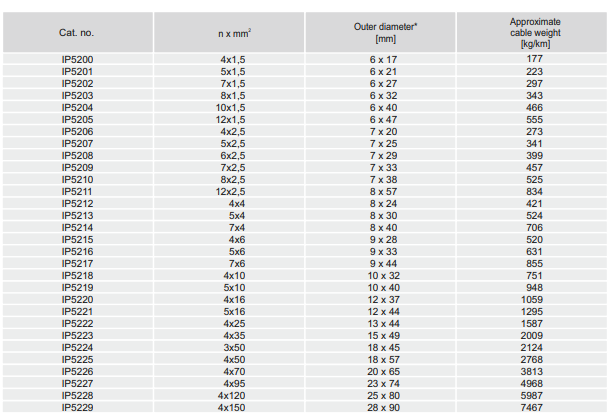

Ideal Applications
The (N)GFLGOEU-J cable's design characteristics make it particularly well-suited for specific industrial applications where conventional cables may prove inadequate. Understanding these application areas helps identify opportunities where this specialised cable can provide significant advantages.
Crane and Hoist Systems
Modern crane systems demand reliable power and control signal transmission to moving components, often across substantial distances and through complex motion patterns. The (N)GFLGOEU-J's flat profile and dynamic capability make it ideal for overhead crane festoon systems, where space constraints and frequent flexing present unique challenges.
The cable's ability to handle trolley speeds up to 180 m/min ensures compatibility with high-speed crane operations, whilst the oil resistance provides protection in industrial environments where hydraulic systems may present contamination risks. The UV and weather resistance enable reliable outdoor operation in port facilities, construction sites, and other exposed applications.
Conveyor Systems and Material Handling
Conveyor systems, particularly those with moving transfer points or adjustable sections, benefit significantly from the (N)GFLGOEU-J's flexibility and durability characteristics. The flat profile minimises interference with moving components whilst providing reliable power transmission through complex motion patterns.
Applications in mining, aggregate processing, and bulk material handling often combine mechanical stress with environmental challenges including dust, moisture, and temperature extremes. The cable's comprehensive environmental resistance ensures reliable operation across these demanding conditions.
Machine Tools with Moving Components
Advanced manufacturing equipment increasingly incorporates moving axes, rotary tables, and linear actuators requiring reliable power and signal transmission. The (N)GFLGOEU-J's flexibility and compact profile make it suitable for applications where space constraints limit cable routing options.
The cable's thermal characteristics support operation in manufacturing environments where ambient temperatures may be elevated due to process requirements. Oil resistance provides essential protection in machining applications where cutting fluids and hydraulic systems present contamination risks.
Industrial Automation and Robotics
Automated material handling systems, including robotic installations and flexible manufacturing cells, present unique cabling challenges combining frequent flexing with precise positioning requirements. The (N)GFLGOEU-J's consistent electrical properties throughout its flex life support reliable operation of sensitive control systems.
The cable's speed tolerance and mechanical durability enable reliable operation in high-throughput automated systems where continuous motion and rapid acceleration/deceleration cycles are commonplace.
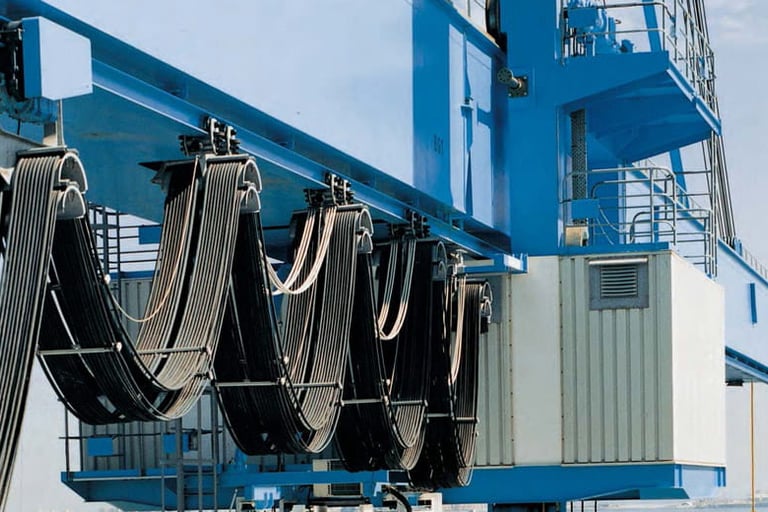

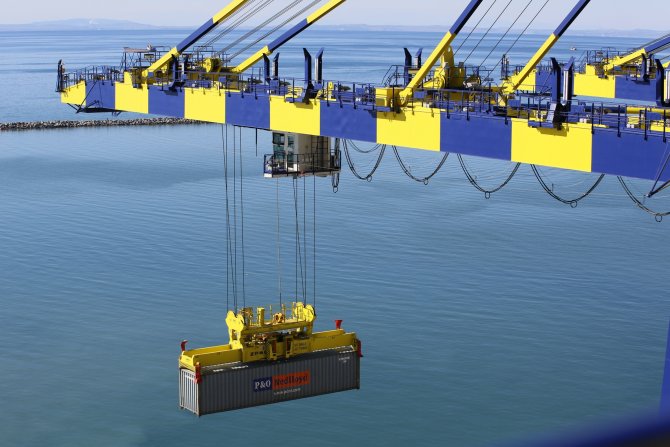

Safety and Standards Compliance
Compliance with recognised international standards ensures the (N)GFLGOEU-J meets essential safety and performance requirements for industrial applications. This comprehensive standards compliance provides confidence in specification decisions and regulatory approval processes.
VDE Standards Compliance
The cable meets VDE 0298-3 requirements for power cables in industrial applications, ensuring compatibility with German and European installation practices. This compliance extends to installation methods, application guidelines, and safety requirements specific to moving cable applications.
VDE 0298-4 compliance addresses specific requirements for cables subject to mechanical stress, including the dynamic loading encountered in festoon systems. This standard recognition provides assurance that the cable design has been validated against recognised criteria for moving cable applications.
European Regulatory Compliance
RoHS 2015/863/EU compliance ensures the cable meets European restrictions on hazardous substances, supporting environmental responsibility and regulatory compliance in EU markets. This compliance is increasingly important as environmental regulations expand globally.
CPR 305/2011 (Construction Products Regulation) compliance addresses fire performance requirements for cables used in construction applications. This compliance ensures the cable meets essential safety requirements for installation in buildings and industrial facilities.
International Standards Recognition
Compliance with IEC 60228 conductor standards ensures compatibility with global electrical practices and equipment requirements. This international recognition simplifies specification processes for multinational installations and ensures consistent performance expectations.
DIN EN standards compliance provides assurance of performance consistency with European practices whilst maintaining compatibility with international installation methods and safety requirements.
Customisation Options and Support
Understanding that industrial applications often present unique requirements, the (N)GFLGOEU-J is available with comprehensive customisation options to meet specific application needs. This flexibility ensures optimal performance across diverse industrial environments.
Configuration Flexibility
Standard configurations provide proven solutions for common applications, whilst custom cross-sections and core numbers address specific power and control requirements. This flexibility eliminates the need for oversized cables whilst ensuring adequate current-carrying capacity for specific applications.
Custom length options eliminate waste and reduce installation complexity, particularly important in applications where precise cable lengths are required for optimal festoon system performance. The ability to specify exact lengths reduces material costs and simplifies inventory management.
Technical Support Services
Comprehensive technical support ensures proper cable selection and application engineering. This support includes application analysis, installation guidance, and performance optimisation recommendations based on specific operating conditions.
Selection guidance helps identify the optimal cable configuration for specific applications, considering factors including electrical loading, environmental conditions, mechanical requirements, and installation constraints. This support reduces specification risks and ensures optimal long-term performance.
Quality Assurance and Warranty
Manufacturing quality assurance processes ensure consistent cable performance and reliability. These processes include materials verification, construction quality control, and performance testing to verify compliance with specifications.
Warranty provisions provide confidence in cable performance and support long-term operational planning. The warranty terms reflect the manufacturer's confidence in cable design and construction quality.
Frequently Asked Questions
Q: What makes the (N)GFLGOEU-J suitable for festoon applications compared to standard round cables?
A: The flat profile distributes bending stress more evenly, reducing fatigue and extending operational life. The design also minimises space requirements whilst providing superior flexibility for one-plane bending applications typical in festoon systems.
Q: Can this cable be used in outdoor applications with direct UV exposure?
A: Yes, the (N)GFLGOEU-J incorporates UV-resistant materials and is specifically designed for unrestricted outdoor use. The weather resistance includes protection against ozone, UV radiation, and moisture.
Q: What is the maximum speed capability for moving applications?
A: The cable is rated for trolley speeds up to 180 metres per minute, making it suitable for high-speed material handling and crane applications.
Q: Is the cable suitable for applications with oil contamination?
A: Yes, the cable meets EN 60811-404 standards for oil resistance, providing reliable operation in environments where hydraulic fluids or lubricants may be present.
Q: What customisation options are available?
A: Custom cross-sections, core numbers, and lengths are available upon request. This flexibility ensures optimal solutions for specific application requirements.
Q: How does the temperature rating compare to standard industrial cables?
A: The cable operates from -30°C to +80°C in festoon applications, with conductor temperatures up to 90°C. This range exceeds many standard cables and supports operation in challenging thermal environments.
Conclusion: A Reliable Solution for Demanding Industrial Mobility
The (N)GFLGOEU-J flat rubber crane cable represents a sophisticated engineering solution specifically designed for the unique challenges of moving industrial equipment. Its combination of mechanical durability, environmental resistance, and electrical performance makes it an ideal choice for festoon systems, crane applications, and other dynamic industrial installations.
The cable's comprehensive standards compliance, customisation flexibility, and proven performance characteristics provide confidence for engineers specifying solutions for critical applications. Whether supporting high-speed material handling, outdoor crane operations, or complex automated systems, the (N)GFLGOEU-J delivers the reliability essential for modern industrial operations.
Investment in properly specified cables like the (N)GFLGOEU-J represents prudent engineering practice, reducing maintenance costs, minimising downtime risks, and ensuring safe operation across demanding industrial environments. As industrial automation continues advancing, the importance of reliable power transmission to moving equipment will only increase, making solutions like the (N)GFLGOEU-J increasingly valuable for forward-thinking operations.
How to Reach Us
Get in Touch
SiteMap
Product Catalogue
Reeling Cable
Festoon Cable
Shore Power Cable




Scan to add us on WeChat
